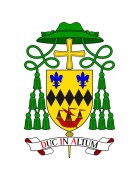Our Archdiocese
- Archbishop
- Bishop
- Vicar General & Episcopal Vicars
- Statistical Overview
- Boundaries of Archdiocese
- Organisational Structure
- Archdiocesan Assembly 2023-24
- Archdiocesan Plan 2016 - 2021
- History
- Coat of Arms
- Fifth Plenary Council of Australia
- Cathedral
- COVID-19 Position Statement
- Modern Slavery Statement
- Connect With Us
2017 Archdiocesan Agencies Commissioning Mass

2017 Archdiocesan Agencies Commissioning Mass
Homily
By the Most Rev Don Sproxton
Auxiliary Bishop of Perth
St Mary’s Cathedral, Perth
Friday 7 July, 2017
Download the full text in PDF
This year’s celebration of Holy Week and Easter was a privileged time for me. I accompanied a group of pilgrims who were sponsored by Catholic Education to take the journey to Jerusalem and to follow the events of Holy Week, study at Tantur Institute and make pilgrimage through Galilee.
The experience is one that will remain with me for a very long time. When the places associated with the life of Jesus are mentioned in the Gospels, I am able to picture them and remember the discussions and the celebrations we had at them. It is true to say that the geography and archaeology of the Holy Land are the Fifth Gospel, for the way they help us to understand the scripture and the life of Christ.
Our study included lectures and discussions on the situation of the Holy Land today. These were given by scholars from the Christian, Jewish and Muslim traditions. They were helpful to us as we came face to face with the everyday struggles of the people who live in this divided land. Each of the communities that live side by side in the land regards it as sacred because of its history: the stage on which God interacted with humanity for over three millennia. Humanity came to know the one, true God and his desire to be with the people as they came to believe and trust him.
This land has been called the Promised Land, the Holy Land. It is the place of encounter with God for the people who lived in the land stretching from modern day Iraq to Egypt. The story of how the people especially chosen by God came to occupy the Promised Land is one we know so well in the Book of Genesis.
Jews will call it the Promised Land, as they recall the story of Abraham and how God brought him and his family to the land he trusted God would show him. On the journey, he received the blessing as well of having two children, Ishmael and Isaac.
Towards the end of the story, we hear how Sarah, Abraham’s wife, died and the way he provided for her burial. He bought a small plot of land in which she was to be buried. This gesture has always been seen by the Jews as the first step taken to possess the Promised Land.
So the sacred history of the land began to unfold. The role of God in the history of Israel was discerned by the prophets and the inspired writers of the Bible. His hand at work could be seen in the decisions and events of the lives of the great figures of that history. Even the choice of the wife for Isaac, through whom the promise of a mighty family for Abraham would come to fruition, came to be seen as God’s work.
Likewise, it is possible to discern the hand of God at work in the mission and ministries of the Archdiocese.
Our gathering today in the Cathedral brings together a small representative group of people who are committed to the formation and care of our Catholic people and many others who have significant needs in our society. The various works that we do in the name of the Catholic Church have enormous impacts on those we serve. The members of our agencies are committed to putting the person that comes to us at the centre of our concern. There are many wonderful outcomes that are achieved in the lives of those we serve. In this Mass, let us thank God for these ways in which lives are enhanced and flourish.
There are those who require ongoing support and encouragement. Let us seek the grace to continue walking with them. Let us never give up. Outcomes that we work to achieve are the hoped- for dreams we have for our people, and yet, as important, are the ways we walk with them. The processes that we employ in responding to the needs of others require of us great attention. Above all, we need to measure our responses according to the Gospel standards.
I know the challenge that this presents. We are human and we are limited. The Gospels invite us to be generous, to walk the extra mile. As workers for the Kingdom of God, we are promised the grace to be partners with Jesus in those moments when we are tested.
Those we seek to serve through our agencies are looking for their Holy Ground. They approach us in the hope that something in their lives can be changed and they can begin a new and positive life. The promise of Jesus for them can be fulfilled when we take on the Spirit of Christ. It is our hope that they will be able to say that they had some kind of encounter with Jesus through our kindness, our listening and our understanding.
The work that we do can become a positive experience within their personal history of salvation, that is, in their walking with God, who invites them to fullness of life.
Let us pray in the Mass for the Spirit of Christ to grow strongly within us. I thank God for your commitment to be the instruments through which the Lord works to bring so many to fuller and freer lives.
